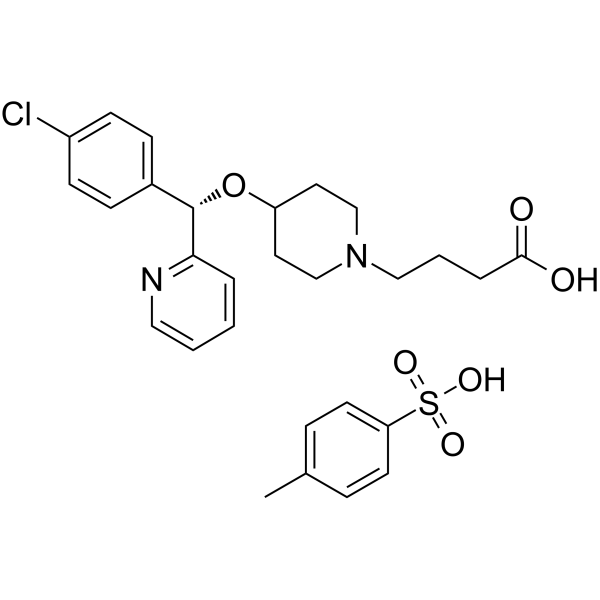1160415-45-1
| Name | Bepotastine tosylate |
|---|
| Description | Bepotastine tosylate is a selective and orally active second-generation histamine H1 receptor antagonist. Bepotastine tosylate has the potential for allergic rhinitis, allergic conjunctivitis and urticaria/pruritus research[1][2][3]. |
|---|---|
| Related Catalog | |
| Target |
Histamine H1 Receptor[1][2][3]. |
| In Vitro | Bepotastine tosylate (10, 100, 1000 µM; preincubates for 120 minutes) decreases the release of histamine induced by A23187 treatment, which reaches a statistically significant reduces level at 1000 µM[2]. Cell Viability Assay[2] Cell Line: RPMCs cells Concentration: 10, 100, 1000 µM Incubation Time: 120 minutes (preincubate) Result: Decreased the release of histamine. |
| In Vivo | Bepotastine tosylate (10 g/L (1.0% (w/v)) for 10 µL; 3 times at intervals of 20 minutes in one eye) demonstrates significant inhibition of PAF-induced conjunctival eosinophil infiltration[2]. Bepotastine tosylate (3 mg/kg; p.o.; once) suppresses scratching behavior to a frequency of 59.0 and a duration of 14.57 seconds, which are almost the same levels compares with the control[3]. Bepotastine tosylate (10 mg/kg; p.o.; once) significantly suppresses serum LTB 4 levels to 711.3 pg/mL at 1 hour and 858.8 pg/mL at 2 hours in NC/Nga mice with a rash[3]. Animal Model: Guinea pigs (6-week-old)[2]. Dosage: 10 g/L (1.0% (w/v)) for 10 µL. Administration: 3 times at intervals of 20 minutes (in one eye) Result: Inhibited PAF-induced conjunctival eosinophil infiltration. Animal Model: Male BALB/c mice(12-week-old); NC/Nga mice[3]. Dosage: 3, 10 mg/kg Administration: Oral administration; once (1 hour before induces scratching behavior of Male BALB/c mice). Result: Significantly inhibited histamine-mediated scratching behavior in male BALB/c mice. Significantly suppressed serum LTB 4 levels in NC/Nga mice with a rash. |
| References |
| Molecular Formula | C28H33ClN2O6S |
|---|---|
| Molecular Weight | 561.09 |
